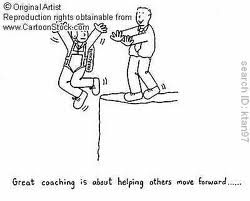Although I have not had this experience myself, I have heard many young teacher talk with exasperation about their experienced colleagues. These teachers, looking for mentorship, problem solving methods and simple direction and assurance from their older and more confident co-workers, have complained that they are often left to their own devices. They claim that experienced teachers tend to find a comfortable groove and are reluctant to do any more than absolutely necessary.
Whilst I realise that this characterisation of experienced teachers doesn’t reflect all who fall into that category, I wonder whether teacher burnout as well as the fact that experienced teachers have reached the peak both in status and salary, are contributing factors to this likely scenario. Since these teachers have devoted decades to what is a challenging and physically taxing profession, the job of mentoring a new teacher can often be too much of burden.
If this is correct, it is quite unfortunate. Our young teachers, in my opinion, are poorly trained. Our teacher training courses are high on useless theory and low on practical instruction. I have never met a teacher who considered Vygotsky’s theory of proximal development of greater use to their day-to-day teaching than the precious but fleeting weeks spent visiting schools as a pre-service teacher.
There clearly needs to be a greater incentive for experienced teachers to help new teachers settle into their role and adjust to the dramatic change from student-teacher to actual teacher.
Last year I formulated a two-tiered approach to making best use of experienced teachers:
1. Experienced teachers who are deemed to be excelling at a certain standard are offered a mentoring role for higher wages. If accepted to take on that role, these teachers would offer new teachers the chance to spend a few days in their classroom, let them observe their lessons, give them access to the their planning material and be someone out of that teacher’s school environment who can deliver advice and guidance via email and phone. This challenges the mentor teacher to strive in their new position as well as their underling.
2. For the second category of teacher, I recommend that newly retired teachers, who have left the profession with a wealth of knowledge and an eagerness to maintain links with the profession, be paid to mentor and assist teachers who have not been performing at the required benchmarks. Instead of firing teachers in the first instance, I propose that these teachers get the opportunity to improve with a greater deal of support and collaboration.
WHAT THIS SOLUTION ACHIEVES
• Provides the opportunity for excellent teachers to be better paid;
• Allows retired teachers to maintain links with their profession and share their wealth of experience;
• Gives new teachers greater confidence and a non-judgemental mentor who they can approach; and
• Allows teachers currently not working at their premium a second chance that may reinvigorate and refresh them.
Tags: Education, Experience, Mentoring, Salery, Schools, Teacher, Teacher Training, Teachers, Teaching, University, Vygotsky, Zone of Proximal Development

May 21, 2012 at 7:25 am |
Are you aware that for some time the NSW DEC employed some teachers in the position of Head Teacher Mentor? They also employ a number of consultants in various areas of expertise to give advice to teachers. I worked in the Catholic system for a short while and found they also employ consultants.
I know what you mean about beginning teachers being thrown in at the deep end, however.
One such beginning teacher I knew had no fewer than 12 professionals of various sorts pecking on him at the one time. They were all singing the same mantra. “Syllabus, syllabus, syllabus.” Not one of them offered a shred of practical advice to this young man working in a very difficult school, with high absenteeism (students), low student achievement with resultant chronic behaviour difficulties.
The fact of the matter was that the syllabus was totally irrelevant under the circumstances.
At one point the principal asked me to sit in his classroom to see if there was any way I could help him manage his class in a more effective way. It was painful to watch. He was doing his level best to deliver the syllabus. The syllabus was irrelevant. This young man, who was full of ideas and enthusiasm, had been set up to fail on so many fronts. He had no chance. My advice was to teach the students at a level where they could achieve success. (Under the circumstances they were also set up to fail and had been doing so for the entire 7 years that they had been at school as confirmed by the ubiquitous NAPLAN). You cannot successfully teach grade 7 work to students who haven’t yet mastered grade 2! This was the expectation of all this young man’s “advisers”. There was no way he was going to follow my advice. The dice were loaded against that.
I think what is missing in the whole equation is the ingredient of good will. Experienced teachers of my era are only too happy to mentor and support younger teachers without extra pay. The problem is that today, experience simply doesn’t cut it any more. So many slick operators are getting promoted on the basis of their whatever it is so that the people running the show have very little idea of the sound educational theory that stood us oldies in good stead. Indeed to many of them it’s a threat to their position as they continue to support clones of themselves. What gets you promotion today is nothing like what got you promotion in my day. Experience counts for nothing.
What you are proposing is a good idea but I fear that the powers that be are too comfortable with the present arrangements.
May 22, 2012 at 12:27 am |
“Experience counts for nothing.” This is such a tragedy John. Being comfortable with the present situation is likely to continue the downward spiral of education.